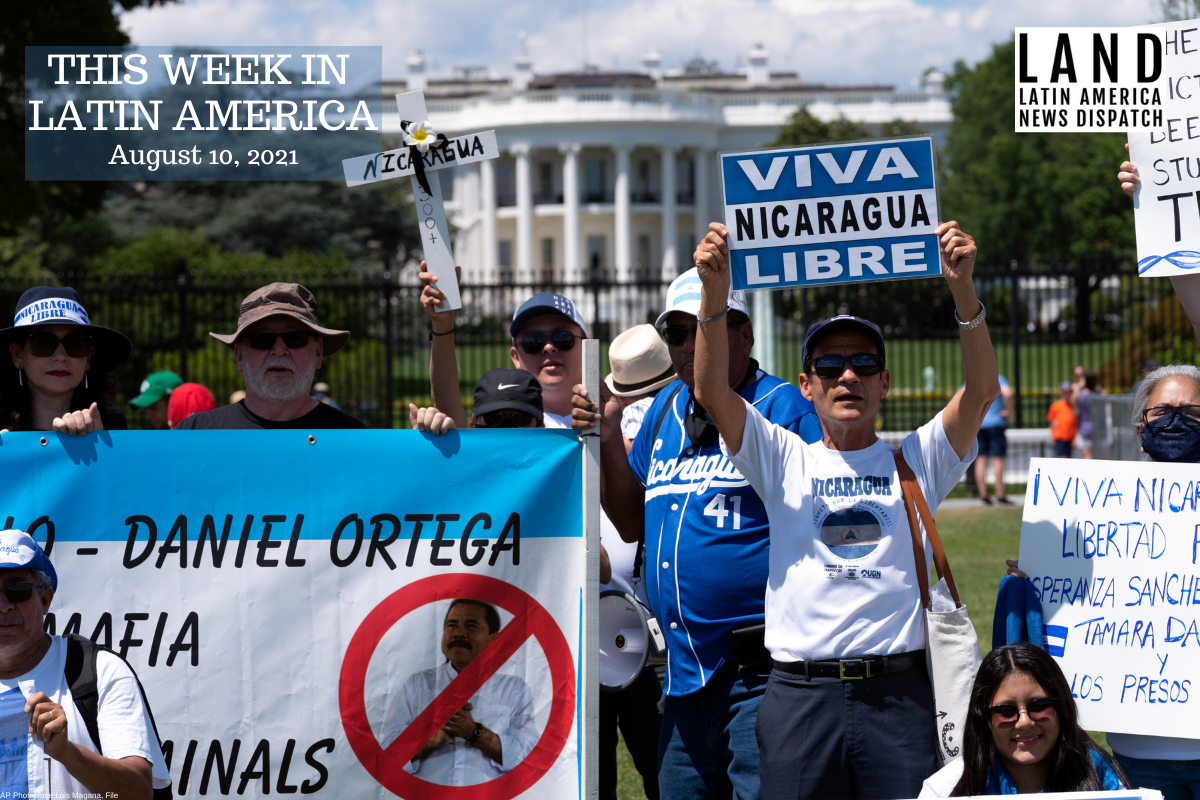

In this June 23, 2021 file photo, people protest for the release of political prisoners in Nicaragua at the Ellipse outside the White House in Washington. (AP Photo/José Luis Magana, File)
NICARAGUA/UNITED STATES: The United States Senate passed a bill aimed at putting more pressure on the government of Nicaragua to allow for a free and fair election in November. The law, called the RENACER Act (Reinforcing Nicaragua’s Adherence to Conditions for Electoral Reform), would allow the Biden administration to impose targeted sanctions against “Nicaraguan officials who seek to derail the country’s electoral process.” The act also calls for President Biden to reconsider Nicaragua’s inclusion in the US-Central American Free Trade Agreement (CAFTA-DR).
The State Department also revoked the visas of 50 Nicaraguans who are relatives of government officials considered to be interfering in the electoral process. Nicaraguans will go to the polls to choose a new president on November 7.
SOUTHERN CONE
CHILE: President Sebastian Piñera announced that people vaccinated in Chile with the Coronavac jab, made by Chinese pharmaceutical Sinovac, will begin receiving a booster shot of the AstraZeneca vaccine after a study found that the Chinese shot loses efficacy over time. The booster shots will begin on August 11.
Meanwhile, Sinovac announced plans to open a $60 million vaccine production facility in the Santiago region, as well as a research facility in Antofagasta. The new facilities will provide vaccines to Chile and other Latin American countries.
ARGENTINA/EU: Legendary Argentine football forward Lionel Messi announced that his 17-year run with the Spanish club Barça will be coming to an end after negotiations for a contract renewal broke down. At a tearful news conference on Sunday, the 34-year-old footballer said that he wanted to stay at Barça, but that issues related to the Spanish Primera División league’s spending regulations made a contract extension impossible. He also confirmed rumors that he is in contract talks with Paris St Germain. On Tuesday August 10, Messi signed with PSG.
THE ANDES
COLOMBIA: Two of the leaders representing opposite sides of Colombia’s decades-long armed conflict testified before the truth commission last week and asked for forgiveness from their victims. Rodrigo Londoño, also known as “Timochenko,” the leader of the FARC rebels, and Salvatore Mancuso, a leader in the Unified Self-Defense Forces of Colombia (AUC), spoke about their decisions to take up arms and offered some details of their participation in the conflict. Mancuso, who is serving a prison term in the United States, spoke about the support and coordination between his organization and the Colombian government. Londoño accepted responsibility on behalf of the FARC for several crimes, including the 2003 kidnapping and murder of Antioquia state Governor Guillermo Gaviria.
COLOMBIA: Police in Bogotá say that they foiled a bomb plot on Thursday when they seized a large amount of pentolite explosives and bomb-making material and arrested two individuals associated with FARC dissidents in the southern part of the capital. Authorities blamed the plot on the “Segunda Marquetalia” group led by former FARC commanders Hernán Darío Velásquez Saldarriaga and Iván Márquez. President Iván Duque has accused Venezuela of protecting Segunda Marquetalia, and police investigators said that last week’s bombing attempt was “ordered from Venezuela,” a charge denied by the Venezuelan government.
THE CARIBBEAN
CUBA: The Cuban State Council approved a law relaxing restrictions on private enterprise on Friday. The new regulations allow for small and medium private companies in certain industries with up to 100 employees. Currently, around 600,000 Cubans work in the private sector, about 13% of the island’s workforce. The liberalization comes a month after the beginning of historic protests against the regime, the introduction of new sanctions from the United States and a severe economic crisis.
HAITI: Thousands of people who fled gang violence in the Martissant neighborhood of Port-au-Prince over the past few months remain displaced, including some who are camped out in a stadium in the suburb of Carrefour. The neighborhood has descended into violence over the past two months as criminal groups fight for control. Last week, the medical nonprofit Doctors Without Borders announced the closure of a hospital in Martissant because of criminal violence in the area.
CENTRAL AMERICA
PANAMA/GUATEMALA: A Panamanian judge has requested the extradition of two sons of former Panamanian president Ricardo Martinelli, who have been locked up in Guatemala for over a year and are accused of involvement in the Odebrecht scandal. The brothers, Luis Enrique and Ricardo Alberto Martinelli Linares, are already fighting an extradition request from the United States.
NORTH AMERICA
MEXICO/UNITED STATES: The Mexican government filed a lawsuit last week against several gunmakers, alleging that the companies are partly responsible for high levels of deadly violence in the country. The suit, filed in a U.S. federal court in Boston, claims that the arms manufacturers are aware of the fact that their products are illegally trafficked into Mexico, and even design certain products to market to Mexican drug traffickers. In addition to demanding up to $10 billion in damages, the lawsuit seeks to push the manufacturers to cease the negligent practices.
MEXICO: The United Nations and the Inter-American Human Rights Commission are pushing the Mexican government to perform a full investigation of the use of Pegasus spyware to monitor journalists, activists and opposition figures during the presidencies of Enrique Peña Nieto and Felipe Calderón. An investigation by the French group Forbidden Stories published last month found that Mexico used the Israeli spyware more than any other country and that it was used to spy on around 15,000 Mexicans, including current president Andrés Manuel López Obrador. Mexican government investigators have so far identified 31 contracts between government agencies and NSO Group, the producer of Pegasus, during the Peña Nieto and Calderón administrations, but López Obrador said that there are no active contracts with the company.
***
Want to receive This Week in Latin America directly to your inbox?
Sign up here.


